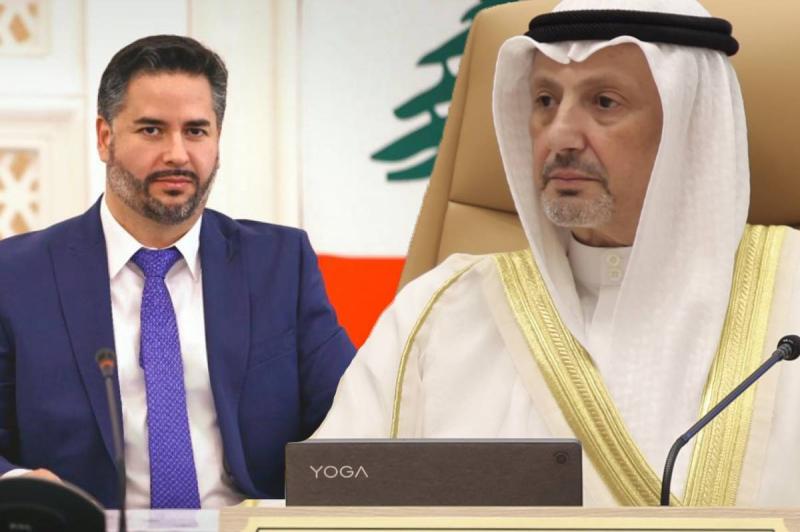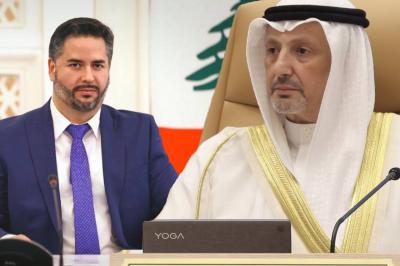The ongoing dispute between Lebanon and Kuwait, stemming from a statement made by Lebanon's caretaker Minister of Economy, Amin Salam, claiming that "Kuwait could help Lebanon with a single stroke of the pen," prompted an intervention from Prime Minister Najib Mikati. Mikati's media office issued a statement on Saturday, asserting that "in light of Minister of Economy and Trade Amin Salam's statement regarding the reconstruction of the grain silos in Lebanon and his call for the sisterly State of Kuwait and its Amir's assistance in that matter, and the subsequent clarification issued by the minister regarding his intentions, it is important for Prime Minister Najib Mikati to reaffirm the depth and strength of the relationship between the two countries and their peoples, which is beyond reproach."
The statement added: "The sisterly State of Kuwait has not hesitated, within the established norms, to extend a helping hand to its brothers in Lebanon over the decades," emphasizing "Lebanon's respect for the principle of non-interference in the internal affairs of all countries, particularly concerning the sisterly State of Kuwait, which follows constitutional, legal, and institutional decision-making processes that reflect a deep-rooted political civilization in Kuwaiti society. Hence, clarification was necessary."
It is noteworthy that the Kuwaiti Foreign Minister Sheikh Salem Abdullah Al-Jaber Al-Sabah, who called for the withdrawal of Salam's statements, is a cousin of Salam. The Kuwaiti foreign minister expressed Kuwait's strong condemnation and bewilderment at the statement made by the Lebanese Minister of Economy and Trade, Amin Salam, coinciding with the third anniversary of the tragic Beirut port explosion, which resulted in numerous casualties and injuries in Lebanon, in addition to the destruction of various vital Lebanese government facilities, such as the grain silos at the Beirut port, which Kuwait had funded the construction of in 1969 through a loan from the Kuwait Fund for Arab Economic Development.
Salam had stated, on the eve of the third anniversary of the port explosion, that he sent a message three weeks prior to the Amir of Kuwait through the Lebanese Foreign Ministry, appealing on behalf of the Lebanese people to rebuild the grain silos, announcing that he requested this for the people of Lebanon, not for the government, "because bread is for the people, and an Arab country cannot be left without a strategic stockpile." He added: "We all hope and pray that within a certain period, we receive a response from Kuwait, as the funds are available. I have contacted the Foreign Ministry, and I learned that there are funds available in the Kuwaiti development fund, and it is possible with just a stroke of the pen today to make a decision to build the silos in Lebanon in Beirut and Tripoli."
In response to this, the Kuwaiti foreign minister stated: "The statement contradicts the simplest political norms and reflects a limited understanding of the decision-making nature in the State of Kuwait, which is based on constitutional and institutional foundations, including the humanitarian grants and loans that the Government of Kuwait provides to brotherly and friendly countries." He also added, according to the newspaper "Al-Jarida": "The State of Kuwait has a rich historical record of supporting brotherly and friendly peoples and countries; however, it firmly rejects any interference in its decisions and internal affairs."
Sheikh Abdullah urged the Lebanese Minister of Economy and Trade to withdraw this statement, keen on maintaining the good bilateral relations between the two brotherly countries.
Before Mikati's statement, Minister of Economy Amin Salam quickly clarified his intentions, stating: "What we meant by using the phrase (with a stroke of the pen), which is a colloquial expression used in Lebanon, is that the matter is executable and quickly so, and it was not intended by this phrase to surpass the constitutional and legal norms in force by the State of Kuwait or Lebanon." Salam expressed his hope that the Kuwaiti parliament would accept this clarification, emphasizing that "I was at ease in my request because I am appealing to a brotherly country that has always stood by Lebanon, and I am aware of the risks surrounding food security, especially since the World Bank has classified Lebanon as the most vulnerable in terms of food security challenges because it lacks a strategic stockpile."




